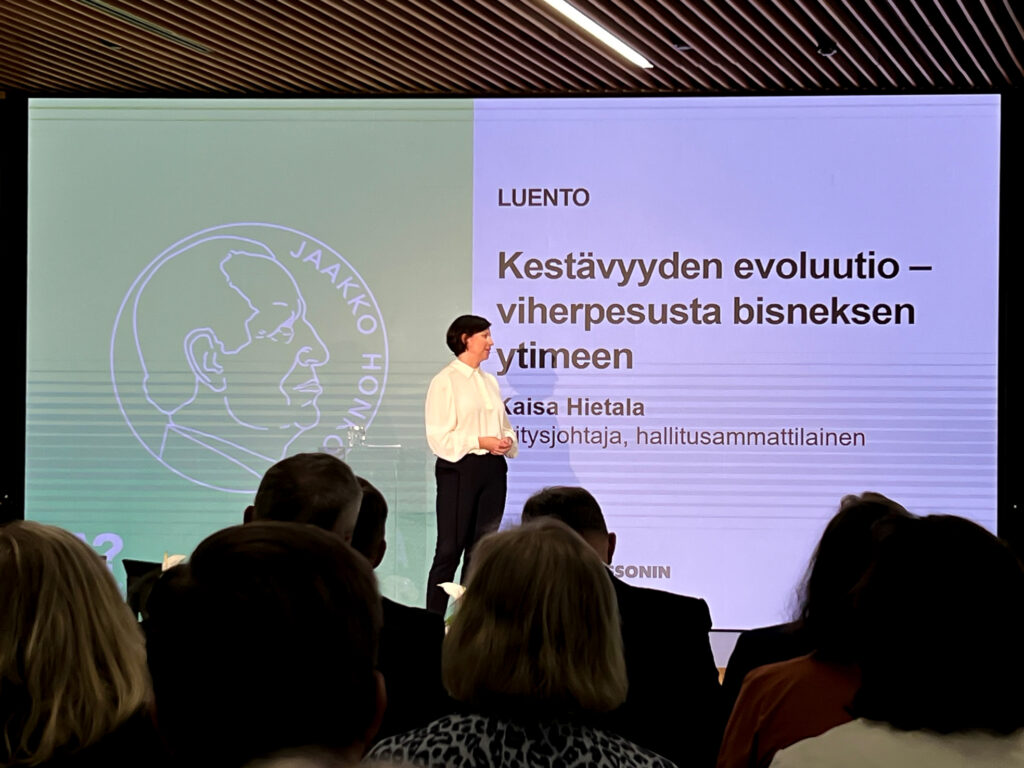
Advanced studies in sustainability
After decades of certification and optimisation, sustainable development finally belongs to the core of companies’ strategies, Kaisa Hietala explained the evolution of sustainable development thinking at the Aalto University School of Economics. She challenged the audience to develop an economic definition for the value of nature, because without it, sustainability of business operations cannot be measured.
The era of certification
Kaisa Hietala, working on the boards of many international companies, stated that companies’ perception of sustainable development has changed over time. When sustainability emerged in corporate communication, it was first seen as creative corporate responsibility reporting. Pagination in reports grew and they were printed on shining paper. Their back covers were decorated with rows of green stamps referring to certified processes. Kaisa Huhtala called those years “the era of certification”. It is fair to say that in those days sustainable development and corporate responsibility were closer to brand than to strategy.
Marketing expenses increased as the word about sustainability was spread in multilingual publications. Naturally, this didn’t last for a long time.
The era of optimization
It is necessary to bring sustainability to the products so that we can get added value and turnover, stated business owners. Product developers were sent looking for ways to add recycled material to products and replace or reduce the use of virgin raw materials. Kaisa Hietala called this “the era of optimization”.
In recent years, the importance of sustainability has started to gain true weight. Circular economy solutions are accelerated, and the effects of operations are measured. Still, the companies have been faced with a double challenge, Hietala said. Regardless of what consumers say in opinion polls, it’s the price that counts at the cashier’s desk, not durability. Only 25 percent of consumers buy a more sustainable product, even if it is more expensive.
Sustainability at the core of business
According to Kaisa Hietala, the decisive change has taken place since 2020. The pandemic destroyed the foundations of global supply chains and exposed the vulnerability of societies. Russia’s attack to Ukraine in 2022 underlined that Europe needs to think about security and dependencies on countries that are unpredictable. Self-sufficiency must be increased, and own production must be protected. Sustainability rose to a strategic level only when the crises were on and even at the same time.
Furthermore, if companies really want to measure their sustainability, the value of nature must be defined in economic terms, Hietala believes. How is the ecological value accrued by companies reflected in the balance sheet, she continued her question.
Surprisingly few hands went up in the audience when Hietala asked whether the university’s researchers who would like to develop it.
Kaisa Hietala’s philosophical reflection continued with the idea that natural capital is a difficult concept because it lacks both the market, the legislation and the trading counterparties. Humans are also only one part of the ecosystem and cannot control nature. Therefore, multidisciplinary research is needed to reconcile the economy and nature. The difficulty factor is increased by the fact that nature’s cycle of evolution and companies’ decision-making go at a completely different pace.
In Hietala’s opinion, in the future, leadership will be measured based on the ability of organizations to change.